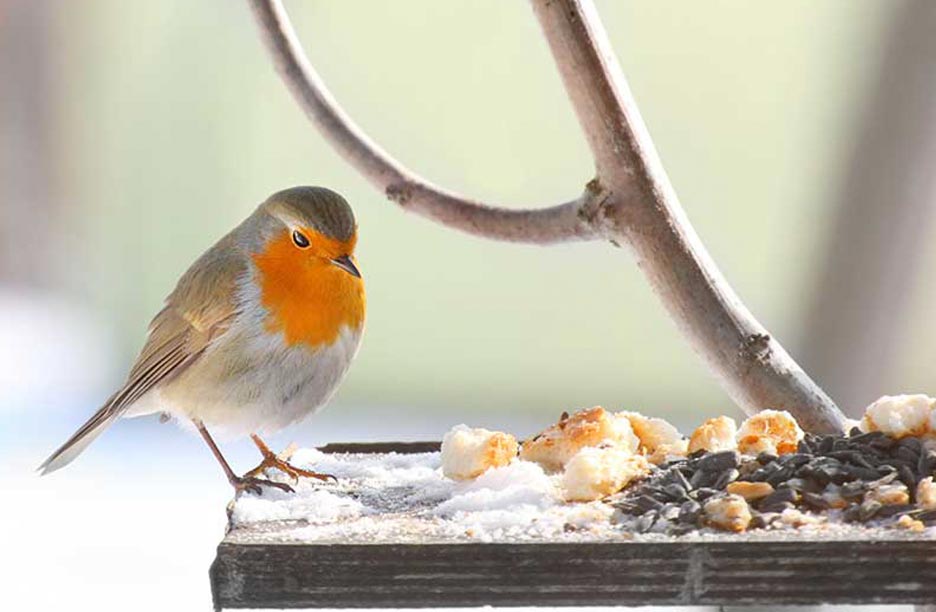Birds are not known to shy away from a plate of leftovers on an outdoor restaurant table. Sometimes they don’t even wait until you leave, pacing at your feet, waiting for a tasty crumb. Although we may mean well when sharing our favorite foods with feathered friends, some foods consumed by humans may cause severe digestive issues, or worse, for birds. Here are some foods to avoid sharing.
Spoiled Birdseed and Nectar
Before filling your bird feeder, check for any strong, rancid odors or signs of mold, bugs, or decay. If birdseed has gotten wet because of a hole in the bag or other improper storage, toss it! Toxic bacteria or mold can grow and rapidly spread, causing health issues or even death to birds ingesting the product. Bugs can infest a container that has not been properly closed, causing digestive problems.
Nectar for hummingbirds is easy and inexpensive to make but can ferment and spoil quickly. Fresh nectar can be refrigerated safely for up to two weeks. However, nectar in feeders outdoors should be replaced every 5-7 days if it’s located in a shady area or every 2-3 days if in a sunny spot or a hot climate. If you find the nectar has become cloudy or discolored, you should discard it to avoid the possibility of toxic bacteria.
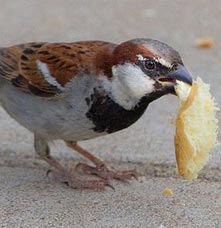
Bread
While offering bread is not necessarily harmful to birds, it has little nutritional value.
If you occasionally offer this treat to wild birds, consider healthy whole grain varieties in small amounts. Make a “sandwich” with peanut butter or other nut butter, suet, seeds, and more appropriate foods. For those with a sweet tooth, you can add grape or orange jelly or even orange marmalade. Do not give birds leftover sandwiches containing processed lunch meats, soft cheeses, sugar-free or reduced sugar spreads, or bacon.
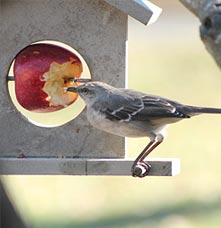
Fruits with seeds and pits may be exposed to toxic pesticides. In addition, fruits with seeds such as apples and pears or pits from cherries, peaches, plums, and mangoes naturally contain poisonous cyanide compounds. By removing any seeds or pits before offering to feathered visitors, these fruits are perfectly safe. Other safe fruits to provide are grapes, squash, tomatoes, melons, mango, pomegranate, and berries. Mashed bananas are also a great treat.
Honey – While a great natural sweetener for humans, it should not be given to birds. With little nutritional value, even the highest quality of honey can harbor E.coli, Listeria, Botulism, and other molds. It is discouraged to use honey while making your hummingbird nectar which only requires a 4:1 ratio of water to white table sugar. Large quantities of sugar can also cause detrimental effects and behavioral changes such as anxiety, irritability, or nervous disorders.
Raw Meat – Meat is known to spoil very quickly, and bacteria can kill birds. Instead of offering raw meat products, consider suet as a high fat but nutritious option. Of course, certain birds such as vultures crave rancid meat but their systems have evolved and adapted so the bacteria works with their body, not against it.
Cheese – Unlike mammals, most birds are lactose intolerant. The enzymes required to digest lactose never developed so it creates a sort of allergic reaction resulting in severe digestive problems. Cheese isn’t technically toxic to birds but can lead to uncomfortable symptoms such as diarrhea.
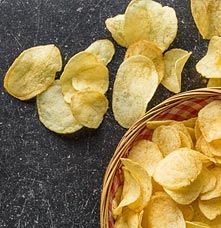
Junk Food – Favorite human snacks like pretzels, potato chips, or corn chips provide little nutritional value and are processed with chemicals. Birds can process small amounts of salt but should avoid highly salted foods. Salt can upset the electrolyte and fluid balance, leading to dehydration, kidney failure, or death. If you’d like to share treats with feathered friends, try air-popped, plain popcorn with no salt or toppings.
Cookies – While you can offer other baked goods such as bread in small quantities, cookies are packed with processed ingredients and additives and offer little nutritional value. Instead, make “cookies” from suet, cornmeal, peanut butter, fruit, and seeds. Click here for an easy suet recipe you can make at home.
Several basic foods toxic to birds:
Avocado – Toxic principle, persin, causes cardiac or respiratory distress. Small birds could perish in a matter of an hour or two, while larger species like ostriches could develop problems several hours after ingestion, with death prolonged for a day or more. Signs of persin poisoning include:
- Inability to perch
- Difficulty breathing
- Fluid around the heart and lungs
- Liver and kidney failure
- Death
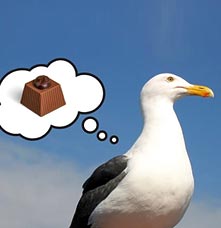
Chocolate – This favorite treat of humans is considered toxic to many animals. Birds find it hard to resist but it can cause diarrhea, seizures, or death. Chocolate contains theobromine and caffeine, which can cause increased heart rate, hyperactivity, tremors, possible seizures, and potentially death. While dark chocolate is healthier for humans, the opposite is true for birds. In this case, the darker the chocolate, the more toxic.
Photo Courtesy UntamedAnimals.com
Onions and garlic – Similar to our canine friends’ digestive systems, these root vegetables are high in toxicity to birds. Highly concentrated forms in garlic powder or dry soup mixes are even more potent and contain sulfur compounds that can irritate a bird’s digestive system and cause ulcers.
Caffeine – As a component of chocolate, caffeine in any form should not be given to birds. An elevated heart rate, tremors, seizures, and possibly death could occur.
Xylitol – A common artificial sweetener, it can cause hypoglycemia, liver damage, and possible death in dogs and other animals. While birds have faster metabolisms, the effect on birds has not been widely studied.
When in doubt, hold onto that treat until you can do proper research or ask a veterinarian.
Approved from the kitchen:
Cooked rice – For many years, there was a discussion that eating uncooked rice was hazardous to birds. For rice to cook and swell, the temperature must reach 212°F. A bird’s internal temperature hovers around 98°F, so there is no chance of it expanding once ingested. However, cooked rice allows a broader range of birds to enjoy it that may have smaller beaks or are younger. Brown rice is an even better option due to its higher nutritional content.
Potatoes – A good source of potassium, vitamin C, carbohydrates, and fat, unsalted potatoes prepared roasted, boiled, baked, or mashed are full of nutrients. Avoid fries, chips, or crisps as they are high in salt and unhealthy fats.
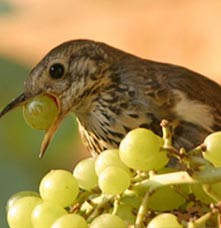
Fruits – Choose those without seeds such as berries, raisins, grapes, and mashed bananas.
Birds are social and love sharing mealtime with companions, even human ones. While we are often tempted to share whatever snack we are enjoying with a cute, chirping little bird hopping around our feet, it’s best to know these potential toxic or disruptive foods to keep our feathered friends safe, happy, and healthy with nutritious foods that are best for their dietary needs.

